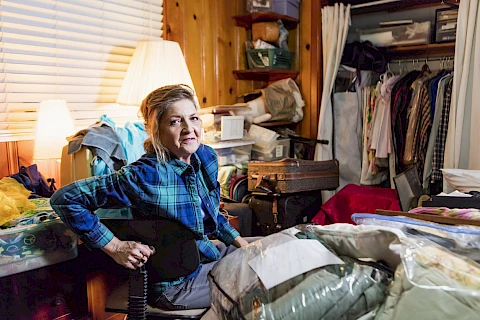
Hoarding among seniors is a troubling issue that can have severe consequences. When an individual collects and keeps many items, it often results in unhealthy living conditions. Caregivers must understand the dangers of hoarding and start taking steps to address it. Let’s explore the invisible risks associated with hoarding and discover how to take action.
Health Hazards
Hoarding can create many different health hazards. Below are a couple of the most common:
- Mold and Mildew: Excessive clutter makes mold and mildew more likely to develop in homes. Items piled high can block air circulation, creating the perfect environment for mold growth. Mold and mildew can cause various health issues, especially for seniors with compromised immune systems. Mold exposure can lead to respiratory problems, skin irritations, and other severe health conditions.
- Worsening Air Quality: Cluttered homes often produce poor air quality because dust and allergens accumulate quickly. With stacks of belongings everywhere, cleaning and maintaining a healthy living space becomes difficult. This dust buildup can lead to respiratory issues like asthma or bronchitis, mainly affecting older adults with pre-existing conditions.
Safety Concerns
One of the most significant risks of hoarding is the increased potential for fires. Cluttered spaces are highly flammable, making it easier for a fire to spread. A home filled with belongings makes it more difficult for emergency responders to navigate and provide help in case of a fire.
Moreover, with so many items occupying the space, pathways become obstructed, leading to a higher risk of trips and falls. Seniors are already prone to falls; a cluttered environment makes it more dangerous. Injuries from falls can be severe, resulting in broken bones or other complications that heavily impact a senior's quality of life.
Mental and Emotional Impact
In addition to physical dangers, hoarding is also detrimental to your mental health. Living in a cluttered, unorganized home can take an emotional toll. The overwhelming amount of stuff causes stress and anxiety, making everyday life more challenging and less enjoyable.
Many seniors who hoard feel embarrassed about their living situation and consequently withdraw from social interactions. This social isolation can strain family relationships and lead to loneliness and depression.
Practical Steps for Caregivers
Early intervention is crucial when dealing with hoarding. Caregivers should be aware of common indicators, such as collecting items of no apparent value, difficulty discarding items, and cluttered living spaces. Prompt recognition of these signs can help address the issue before it becomes more severe.
Once you've identified a problem, the next step is creating a plan to address it. Here are some actionable steps:
- Start with one room at a time to make the task feel more manageable.
- Set small, achievable goals to avoid feeling overwhelmed.
- Involve the senior in decluttering for emotional support and better outcomes.
- Seek professional help if needed. Sometimes, hoarding can be a sign of deeper psychological issues that require expert intervention.
Take Action Against Hoarding
Hoarding poses numerous invisible dangers to seniors, from health hazards like mold and worsening air quality to safety concerns about fire risks and trips. It's also crucial to acknowledge the mental and emotional impact, which can lead to stress, anxiety, and social isolation.
Taking prompt action ensures the well-being of seniors. If you're a caregiver in Allentown, Bethlehem, Kutztown, Nazareth, or Schnecksville, contact us at Senior Helpers Lehigh Valley for the support and resources you need to create a safer, healthier environment for your loved one. We are here to discuss our services for seniors and their caregivers, such as Personal Care and Companion Care.